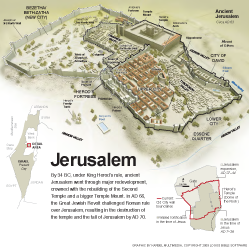101:title–8 The specific genre of Psa 101 is difficult to determine. It most likely belongs with the temple entry psalms as the psalmist declares his worthiness to enter the temple (see 15:title–5 and note). The psalmist shows his commitment to faithfulness, justice, and integrity (vv. 1–2) and his rejection of evil (vv. 3–4). He extends his personal righteousness to others as he expresses his intention to expel the wicked and corrupt and look favorably on the faithful (vv. 5–8). |
 Types of Psalms Table
Types of Psalms Table
101:title Of David. A psalm See note on 3:title.
101:1–2 The psalmist commits himself and his house to integrity and obedience (Deut 17:14–20) as he looks to worship at the temple. Compare Ps 15:1–2. |
101:1 loyal love God’s chesed is one of his essential characteristics. See note on 25:10.
justice Refers to a decision or judgment in a legal dispute.
I will sing praises The word zamar used here refers to singing or to playing an instrument. See 92:3 and note.
101:2 I will give attention The psalmist hopes to gain wisdom and insight through thoughtful reflection; he wants to find out how to obey.
the way of integrity The Hebrew phrase used here is derekh tamim. The Hebrew word tamim has a sense of “faultlessness,” and indicates a high degree of integrity and honesty. The psalmist needs to demonstrate faultless piety in order to fulfill his function well (compare Deut 17:14–20).
When will you come to me While the psalmist desires God’s presence at a personal level, he also likely seeks God’s military and political help.
in the midst of my house The psalmist begins with his closest sphere of control—his own house. He later moves to society in general (v. 8), declaring his zealous desire for all in the land of Israel to honor Yahweh.
101:3–5 The psalmist extends his commitment to personal integrity by rejecting evil, including the evil behavior of others. Compare 15:3–5. |
101:3 it will not cling The psalmist implies that he will not allow the impious and irreligious to be part of his life.
101:4 perverse The word iqqesh (“twisted” or “false”) contrasts with yashar (“straight” or “upright”) of 94:15 and 97:11.
101:5 slanders See Lev 19:16 and note.
I will destroy Previously, the psalmist expelled evildoers from his presence (Ps 101:3). Now, the psalmist seeks justice for those who have been treated unjustly. He vows to remove oppressors.
101:6–8 In these verses, the psalmist describes his intention to support the faithful, remove wicked people from the land, and remove any evil from his own house. This implies that the author is in a position of authority, such as that of a king. |
101:6 they may live The psalmist intends to surround himself with those who are faithful to God and His ways. Compare vv. 3–4.
the way of integrity, he See v. 2 and note.
shall minister to Describes the service that priests perform before Yahweh, as well as the work servants do before a human king (Est 1:10).
101:7 in the midst of my house The psalmist reiterates his previous resolutions. See Ps 101:2 and note.
101:8 Each morning The psalmist describes his continual dedication.
the land, cutting off See v. 6 and note.
the city of Yahweh Refers to Jerusalem, which seems to be an emblem for the whole nation since it includes the palace of the Davidic king, a larger area around it, and the temple (once it was built). The statement in this verse implies that the psalmist views Jerusalem, and the land of Israel in general, as sacred. See note on 20:2.
which seems to be an emblem for the whole nation since it includes the palace of the Davidic king, a larger area around it, and the temple (once it was built). The statement in this verse implies that the psalmist views Jerusalem, and the land of Israel in general, as sacred. See note on 20:2.

|
About Faithlife Study BibleFaithlife Study Bible (FSB) is your guide to the ancient world of the Old and New Testaments, with study notes and articles that draw from a wide range of academic research. FSB helps you learn how to think about interpretation methods and issues so that you can gain a deeper understanding of the text. |
| Copyright |
Copyright 2012 Logos Bible Software. |
| Support Info | fsb |
 Loading…
Loading…


